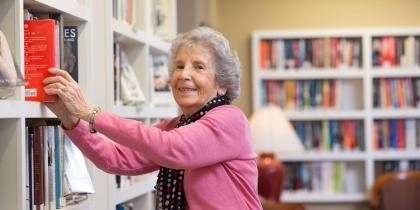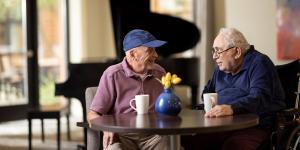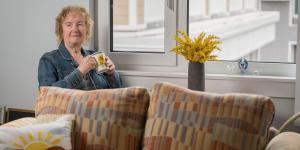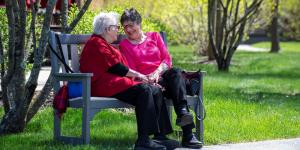The Power of Lifelong Learning and Why It’s Never Too Late to Start
Protecting your brain as you age — yes, you can!

At age 93, Maggie Scarf’s lifelong passion for learning as much as she can hasn’t slowed down. A bestselling author and former Yale University teacher of creative writing, Maggie is now a resident of Orchard Cove in Canton, MA, where she attends as many of its robust lecture offerings as she can — from French literature to Beethoven to foreign film. “Between these classes, my reading, exercising, and the programming committee, I keep my life full and busy. That’s how I run my life,” she says.
As Maggie’s schedule shows, learning doesn’t stop as we age. Our brains can grow, learn, and adapt at any age.
Scientists used to believe that the brain stopped changing after a certain point in life. That’s simply not true. Our brains remain plastic, meaning they can rewire themselves, form new connections, and adapt well into our 80s, 90s, and beyond. This incredible capacity is known as neuroplasticity.
In fact, one of the best things you can do to support brain health is to stay curious, keep learning, and be willing to try new things, no matter your age.
Let’s explore how lifelong learning supports brain health and why it’s never too late to start.
The power of lifelong learning
Lifelong learning isn’t just about taking classes or reading books — it’s about staying curious, trying new things, and challenging your brain in meaningful ways. Studies show that engaging in mentally stimulating activities helps keep your brain flexible and resilient, thanks to neuroplasticity.
Whether you’re learning a language, picking up a musical instrument, exploring the natural world, or diving into a new hobby, you’re helping build what scientists call cognitive reserve — a kind of brain “buffer” that protects against age-related decline and even dementia. The best part? It’s never too late to start.
Maggie's exploration of Orchard Cove’s offerings has also helped her form new social connections. “In every one of these courses, I meet people with similar interests. I get to know others through these courses because they are the same engaged type of people,” she explains. One woman she met through the French literature course, where a professor facilitates discussions on books they read, has started affectionately calling her “sis” because they always react similarly to the material.
The brain: A complex, flexible orchestra
Your brain is an amazing, three-pound organ made up of billions of specialized cells called neurons. These neurons connect to form neural networks, which are the foundation for your thoughts, memory, movement, emotions, and everything that makes you you.
The more we use these networks, the stronger they become. Think of your brain like an orchestra: different regions “play” harmoniously to support various functions. When you engage in something new or challenging, you’re asking new parts of that orchestra to play — and with practice, they get better, louder, and more coordinated. This is the biological basis of learning.
The more you stimulate your brain in novel and challenging ways, the more flexible and resilient those networks become.
Just think for a moment: What are you an expert in? Maybe it’s cooking, fixing things around the house, gardening, or trivia. Whatever it is, the time you’ve spent on it has left a neuronal signature. Every repeated action, every moment of learning, strengthened the connections in your brain. That’s not just a neat fact — this is similar to what scientists have seen in people who age well despite having signs of Alzheimer’s in their brains. Their lifelong engagement in learning, hobbies, and social activities helped build up brain reserve and cognitive reserve, allowing them to maintain functioning even during physical brain changes.
Brain reserve: The brain’s backup plan
Brain reserve refers to the brain’s structural resilience — how much “extra capacity” it has to handle change or injury. The denser and more efficient your neural networks are, the better your brain can handle changes like disease, injury, or aging.
Cognitive reserve goes hand-in-hand. It refers to the flexible and adaptive ways your brain solves problems, often relying on learned strategies or alternate pathways.
These concepts mean the brain has built extra connections, strength, and resilience. The brain can keep functioning if any damage occurs, which can happen naturally with age, because it has backup systems.
So, how do we build that reserve? Here’s the exciting part: You can build both brain reserve and cognitive reserve through activities that challenge your brain, especially lifelong learning.
Lifelong learning strategies for better brain health
So, how can you support your brain’s health and growth today? The good news: it’s often simple, joyful, and deeply rewarding. Here’s what science recommends:
- Engage in new ways.
- Be willing to be a beginner again.
- Challenge yourself regularly.
- Stay socially connected.
- Move your body.
- Stay curious.
Remember to start where you are. Choose what excites you, not what you think you “should” do. That’s an approach Maggie takes when choosing which lectures to attend. She cites a recurring instructor from the Berklee School of Music who has taught classes on Mozart, Beethoven, other composers, and music theory to Orchard Cove residents. “Her classes seem to last five minutes, though they last an hour and fifteen minutes,” says Maggie. Reading the synopsis of an upcoming series on Russian intelligence and spycraft, she said the topic “blew her mind.” She plans to attend that series as well!
And perhaps most importantly: do these things consistently! Repetition helps reinforce the connections you’re working so hard to build. Just as muscles strengthen with use, so do your neural networks.
Brain-boosting activities you can try today
You don’t need a formal classroom or expensive tools to keep your brain engaged. Here are some easy, enjoyable activities — backed by science — that you and your loved ones can try to stay mentally sharp:
Learning a new language
- Use apps like Duolingo, Babbel, or Mango Languages — even 10 minutes daily makes a difference.
- Label common objects around your home in the new language.
- Practice aloud while doing daily tasks in the language you’re learning.
Playing a musical instrument
- Try beginner-friendly instruments like the ukulele, keyboard, or drums.
- Follow free online tutorials — YouTube has excellent lessons tailored to older adults.
- Set a goal: learn to play a favorite song or join a local jam group for fun social practice.
Gardening
- Start small with herbs or succulents indoors if you lack space.
- Keep a gardening log — tracking planting, weather, and growth supports memory.
- Join a community garden or local horticultural group to stay connected and active.
Joining a book club
- Reading fiction helps boost empathy, imagination, and verbal ability.
- Rotating book selection can keep things fresh and challenging.
Arts and crafts
- Try painting, pottery, knitting, woodwork, or collage — anything that engages your hands and imagination.
- Share your creations with others — online or in-person — for added meaning and motivation.
Nature walks and outdoor exploration
- Take a walk in your neighborhood, on local trails, or at a botanical garden and engage your senses — notice the colors, sounds, and textures.
- Use apps like Merlin Bird ID and Seek by iNaturalist to deepen the experience.
- Document your walks with a small nature journal or phone notes — record what you see, feel, and learn.
Taking an online class
- Platforms like Coursera, edX, Senior Planet, and GetSetUp offer free or low-cost classes specifically for older adults.
- Choose topics you’ve always been curious about — history, photography, science, creative writing — you name it!
Cooking and baking
- Try a new recipe every week — especially from a culture other than your own.
- Invite a friend or family member to combine cooking and connection.
Storytelling or memoir writing
- Reflect on your life’s adventures by writing down or recording your memories.
- Share stories with children or grandchildren, strengthening intergenerational bonds and supporting long-term memory.
- Try memoir-writing prompts or join a creative writing group to spark ideas.
Theater, improv, or public speaking
- Participate in community theater or a Toastmasters group to help boost verbal fluency, memory, and confidence.
- Join in improv games that challenge you to think on your feet and embrace humor and spontaneity.
Small steps taken consistently lead to big benefits for your brain. The key is to keep it new or unfamiliar, challenging, meaningful, and social. These aren’t just hobbies — they’re your brain’s secret workout plan. Through lifelong learning, every moment of curiosity is a step toward building a stronger, more resilient brain.
Start today! It’s never too late.
Senior living communities where you can learn and thrive
There's something for everyone!
Another brain health-boosting option is the Brain Health and Wellness Coaching Program at the Deanna and Sidney Wolk Center for Memory Health. This program helps participants strengthen everyday habits that support brain health — including lifelong learning. Whether you're experiencing mild cognitive changes or simply want to enhance your overall health and well-being, it offers a personalized wellness plan, accountability, and guidance.
Learning is part of daily life at Hebrew SeniorLife’s senior living communities. Residents enjoy opportunities ranging from thought-provoking lectures by visiting scholars to hands-on art classes, live music performances, group fitness classes, and special interest groups. There’s something for everyone!
If you’re considering moving to senior living, find a service or community online today to learn more about what we offer.
Rachel Fox, CWC, also contributed to this blog post.




